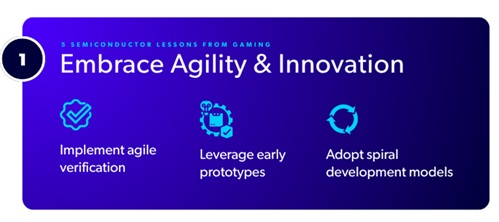Coby Hanoch comes to Weebit Nano with 15 years’ experience in engineering and engineering management and 26 years’ experience in sales management and executive roles. Coby was Vice President Worldwide Sales at Verisity where he was part of the founding team and grew the company to over $100M in annual sales which facilitated its… Read More
 Think Quantum Computing is Hype? Mastercard Begs to DisagreeJust got an opportunity to write a blog…Read More
Think Quantum Computing is Hype? Mastercard Begs to DisagreeJust got an opportunity to write a blog…Read More TSMC Kumamoto: Pioneering Japan's Semiconductor RevivalIn the lush landscapes of Kumamoto Prefecture, on…Read More
TSMC Kumamoto: Pioneering Japan's Semiconductor RevivalIn the lush landscapes of Kumamoto Prefecture, on…Read More Memory Matters: The State of Embedded NVM (eNVM) 2025Make a difference and take this short survey.…Read More
Memory Matters: The State of Embedded NVM (eNVM) 2025Make a difference and take this short survey.…Read More 5 Lessons the Semiconductor Industry Can Learn from GamingBy Kamal Khan The semiconductor world has always…Read More
5 Lessons the Semiconductor Industry Can Learn from GamingBy Kamal Khan The semiconductor world has always…Read MoreWebinar: Post-layout Circuit Sizing Optimization
My IC design career started out with manually sizing transistors to improve performance, while minimizing layout area and power consumption. Fortunately we don’t have to do manual transistor sizing anymore, thanks to EDA tools that are quicker and more accurate than manual methods. MunEDA is an EDA vendor that has developed… Read More
New ECO Product – Synopsys PrimeClosure
New EDA product launches are always an exciting time, and I could hear the energy and optimism from the voice of Manoj Chacko at Synopsys in our Zoom call about Synopsys PrimeClosure. During the physical implementation phase for IC designs there’s a big challenge to reach timing closure, and with advanced nodes the number… Read More
Test Ordering for Agile. Innovation in Verification
Can we order regression tests for continuous integration (CI) flows, minimizing time between code commits and feedback on failures? Paul Cunningham (Senior VP/GM, Verification at Cadence), Raúl Camposano (Silicon Catalyst, entrepreneur, former Synopsys CTO and now Silvaco CTO) and I continue our series on research ideas.… Read More
Whatever Happened to the Big 5G Airport Controversy? Plus A Look To The Future
In December 2021, just weeks before Verizon and AT&T were set to enable their new radio access networks in the 5G mid-band spectrum (also known as C-Band), the Federal Aviation Administration (FAA) released a Special Airworthiness Information Bulletin (SAIB) and a statement notifying operators of potential 5G interference… Read More
WEBINAR: How to Accelerate Ansys RedHawk-SC in the Cloud
As we all know, growing complexity of IC designs and the resulting numbers of EDA tools and design steps lead to very intricate workflows which require compute cycles that outstrip current compute capacity of most IC enterprises. The obvious question is how to efficiently leverage near infinite compute capacity in the … Read More
Arm and Arteris Partner on Automotive
Whenever a new partnership is announced, the natural question is, “why?” What will this partnership make possible that wasn’t already possible with those two companies working independently? I talked yesterday with Frank Schirrmeister of Arteris on the partnership. (Yes, Frank is now at Arteris). And I just got off an Arm press… Read More
3D IC – Managing the System-level Netlist
I just did a Google search for “3D IC”, and was stunned to see it return a whopping 476,000 results. This topic is trending, because more companies are using advanced IC packaging to meet their requirements, and yet the engineers doing the 3D IC design have new challenges to overcome. One of those challenges is creating… Read More
Arm 2022 Neoverse Update, Roadmap
Arm recently provided their annual update on the Neoverse product line, targeting infrastructure from cloud to communication to the edge. Chris Bergey (SVP and GM for infrastructure) led the update, starting with a shock-and-awe pitch on Neoverse deployment. He played up that Arm-based servers are now in every major public … Read More
UCIe Specification Streamlines Multi-Die System Design with Chiplets
Over the last few years, the design of application-specific ICs as well as high-performance CPUs and other complex ICs has hit a proverbial wall. This wall is built from several issues: first, chip sizes have grown so large that they can fill the entire mask reticle and that could limit future growth. Second, the large chip size impacts… Read More













EDA Has a Value Capture Problem — An Outsider’s View